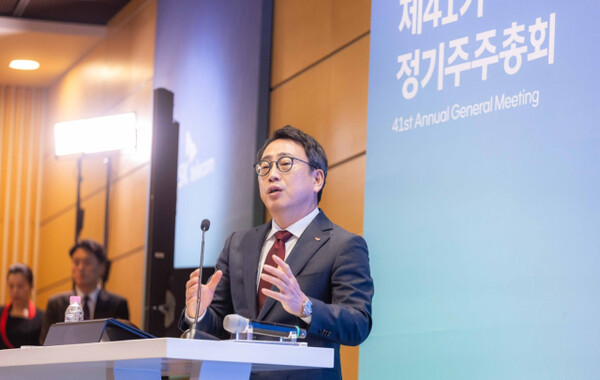‘AI Pyramid 2.0’ Strategy Explained at Annual General Meeting
Yoo Young-sang, president of SK Telecom, announced on March 26 plans to introduce NVIDIA’s successor to the H series, Blackwell, as a graphics processing unit (GPU) for data centers.
During a meeting with reporters after the annual general meeting held at the T Tower headquarters in Euljiro, Seoul, Yoo responded to a question about the GPU introduction plan, saying, “It seems that Blackwell is more efficient than the H200, so we plan to introduce it in response to demand.” He projected the introduction of Blackwell GPUs for the second to third quarters of this year.
Regarding the bid for the National Artificial Intelligence (AI) Computing Center, he explained, “While the intention is agreeable, there are various complex conditions, and we are in discussions with the government. If the discussions proceed smoothly, I believe we can build the national AI infrastructure in various ways. Even if not through that project, we are willing to contribute to the establishment of the National AI Computing Center as a telecommunications company.”
Yoo also addressed the Fair Trade Commission’s imposition of corrective orders and a total fine of 114 billion won on the three telecommunications companies for collusion, stating, “We plan to proceed with administrative litigation and will seek the court’s judgment regarding the fines.”
At the general meeting, Yoo shared the 2024 financial results and business performance with shareholders and detailed the “AI Pyramid 2.0” strategy, which organizes specific methods for “AI Performance Generation” as an AI supplier. He introduced the “AI Pyramid 2.0” strategy, optimized for generating tangible AI performance through “selection” and “focus” from the existing pyramid strategy.
In particular, SK Telecom plans to target the market with four business models in the AI data center domain: subscription-based AI cloud GPUaaS (GPU as a Service) service, small modular AI DC, dedicated AI DC for single customers, and hyperscale AI DC.
Responding to shareholder inquiries about securing competitiveness in GPUaaS services, Yoo stated, “As you know, the B2B environment in our country tends to protect its own interests. Despite our superior performance and pricing, there have been aspects where we haven’t succeeded in bids.” It is known that SK Telecom participated in a large-scale GPUaaS bid ordered by FortyTwo Dot, an autonomous driving subsidiary of Hyundai Motor Group, the largest shareholder of KT, but faced defeat against competitors like Naver Cloud and KT Cloud.
In the AI B2B domain, SK Telecom plans to actively pursue monetization through the upcoming launch of “A.Dot Biz,” an AI B2B agent, following enterprise AI utilizing SK Telecom’s existing AI technology and AI cloud targeting double-digit growth. Yoo stated, “By 2025, SK Telecom will create new revenue through the advancement of AI business, maximizing shareholder value and corporate value, and will lead the creation of a ‘Korean AI ecosystem’ by demonstrating specific achievements with AI.”
Meanwhile, at the 41st general meeting, SK Telecom approved the following agenda items: approval of the 2024 financial statements, partial amendment of the articles of incorporation, and the appointment of a total of two directors. The consolidated financial statements for 2024 were approved with annual sales of 17.94 trillion won and operating profit of 1.823 trillion won, reflecting growth of 1.9% and 4.0% compared to the previous year, respectively. The annual dividend per share was confirmed at 3,540 won, the same as the previous year.
SK Telecom amended its articles of incorporation to be shareholder-friendly, allowing investors to confirm dividends and invest accordingly. The new articles will be applied from March 26, and SK Telecom will set the dividend record date and dividend amount within 45 days from the end of the quarter through board resolutions and announce them two weeks in advance.
SK Telecom appointed lawyer Kim Chang-bo and Kang Dong-su, head of SK Corp.’s PM division, as a new outside director and other non-executive director, respectively. The new outside director will perform various duties in the board’s decision-making process based on his expertise accumulated since 2000. Kang will contribute to the company’s continuous growth in the telecommunications and AI business domains.
출처 : Businesskorea(https://www.businesskorea.co.kr)
https://www.businesskorea.co.kr/news/articleView.html?idxno=238365





